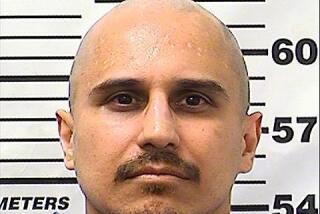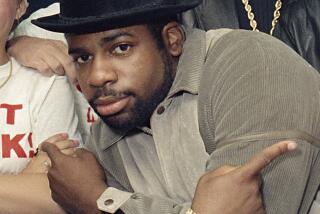Plea Bargain Closes Bryant Family Case
- Share via
The fate of the last defendant in the tangled “Bryant Family” murder case was resolved Tuesday with a plea bargain under which admitted drug dealer and killer Jon Preston Settle could be out of prison in as little as seven years.
“That’s a helluva deal,” said Settle’s lawyer, Richard Leonard, noting that Settle’s three co-defendants were convicted of first-degree murder and sentenced to death.
But Settle, a slight, soft-spoken man who represented himself during a lengthy trial last year, escaped the same outcome by a single vote when the jury deadlocked 11 to 1 in favor of a guilty verdict.
He and his lawyer have been negotiating with prosecutors ever since on whether he should be retried. They finally agreed that Settle would admit his culpability in the 1988 slayings of two rival drug dealers, a witness, and her 2-year-old daughter, but in exchange for lesser charges.
So in a brief hearing Tuesday in Los Angeles Superior Court, Settle pleaded guilty to voluntary manslaughter for the deaths of Andre Armstrong, James Brown, Loretha Anderson and young Chemise English. The shootings in Lake View Terrace helped expose the inner workings of the Bryant Family, then a powerful crack cocaine empire based in the northeast San Fernando Valley.
Settle, 35, also pleaded guilty to the attempted murder of Anderson’s surviving son, 1-year-old Carlos English Jr., and to using a firearm in each of those crimes--a total of 10 counts that carry a combined maximum sentence of 21 years and four months in state prison.
Judge Charles E. Horan scheduled Settle for sentencing on Jan. 31, and warned him to expect a punishment as close as possible to the maximum.
“I’ll hear whatever you have to say,” Horan told Settle, “but I don’t want you to be under any illusions.”
Leonard said later however that because of the seven years Settle has already served awaiting trial in county jail, and because of prison work programs that with good behavior could cut his remaining 14 years in half, Settle could conceivably be released in seven years.
“The other guys--they’re gonna be in [prison] the rest of their lives,” Leonard said.
Deputy Dist. Atty. Kevin McCormick said it made sense not to retry the complicated case, which cost more than $2 million, took seven years to begin a nearly six-month trial, and involved dozens of witnesses--many requiring special protection because of their fear of the family.
Settle is also concerned for his safety and may seek protective custody in prison, according to Leonard, particularly because he testified against co-defendants Stanley Bryant, LeRoy Wheeler, and Donald Franklin Smith.
The three were convicted last summer of ambushing Armstrong, a power-hungry Bryant Family hit man, and his partner, Brown. Armstrong and Brown were trapped by a cage-like metal security door at a crack house and shot to death in a blaze of shotgun and semiautomatic pistol fire.
Bryant, who ran the organization with his brother Jeffrey, masterminded the Aug. 28, 1988, killings, which were carried out by his employees.
Brown had brought along his girlfriend, Anderson, and her children, who were waiting outside the house in a parked car. As soon as the men were killed, Wheeler went out to the car, fatally shooting the woman and her daughter at point-blank range. Anderson’s son was injured by shattered glass but survived.
In outlining his reasons for a plea agreement on Tuesday, prosecutor McCormick said Settle had shot either Armstrong or Brown but had played a “subsidiary role” in the slayings to Bryant and Smith. He also said Settle probably “only acted as an aider and abettor” in the deaths of Anderson and her child, but did not actually shoot them.
The prosecutor also noted that, unlike his co-defendants, Settle had no prior convictions as an adult. “It would appear to me this is a reasonable compromise,” McCormick told the judge.
Later, McCormick said he was confident that if Settle is placed in protective custody in state prison, he will be safe. He also said Settle would be eligible for a witness protection program once he is released.
Leonard was more skeptical, saying, “Once you’re in state prison, if any one group wants to kill you, they’re going to kill you and I don’t care if you’re in protective custody--they’re still going to kill you.” He said he and Settle had argued unsuccessfully for Settle to be sent to a prison out of state.
But Leonard also said Settle, who clearly has prevailed in the case through a combination of luck and skill, knows how to take care of himself.
“Jon’s a survivor,” Leonard said.
More to Read
Sign up for Essential California
The most important California stories and recommendations in your inbox every morning.
You may occasionally receive promotional content from the Los Angeles Times.













